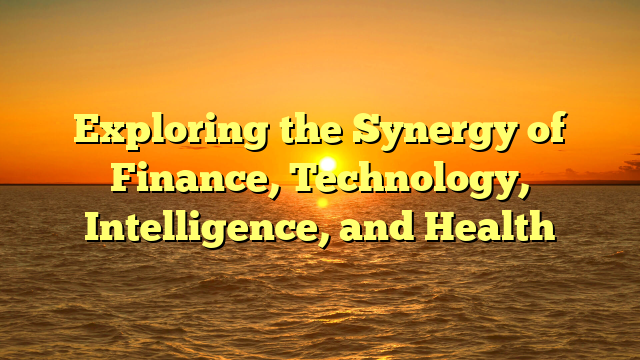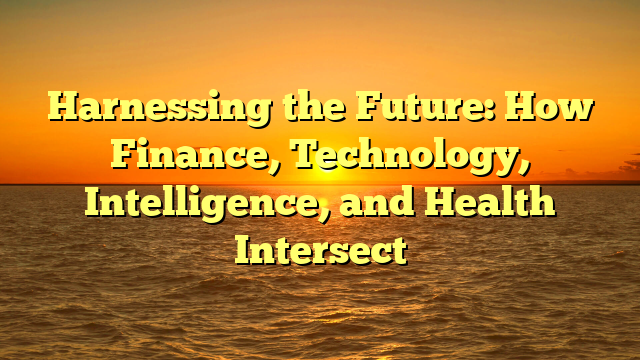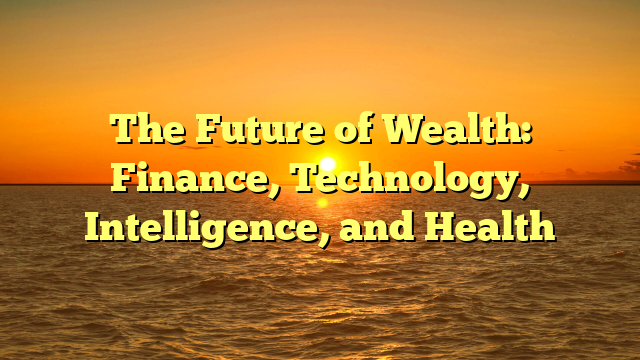Introduction
In the modern world, finance and innovation are often seen as driving forces behind the advancement of human well-being. With rapid developments in AI and breakthroughs in the medical field, it’s clear that these domains are interconnected in ways that shape our future. This article will explore the interconnections between finance, technology, intelligence, and health, demonstrating how they influence each other and contribute to shaping a better future.
—
Section 1: The Role of Finance in Shaping Innovation
Finance plays a crucial role in fueling technological advancements and innovations. Investment in research and development (R&D) is essential for creating new technologies that can transform various sectors, including health and intelligence. With sufficient funding, businesses can create new solutions that address pressing global challenges.
For example, venture capital funding is often directed towards startups in emerging industries, leading to the development of cutting-edge technologies like artificial intelligence, blockchain, and biotechnology. This funding is a key driver of economic growth and innovation, enabling breakthroughs in areas such as medicine and education.
The financial sector itself has also embraced new technologies. Fintech, a rapidly growing industry, uses machine learning and blockchain to create more efficient and transparent financial services. From digital banking to investment management, technology has improved the accessibility and efficiency of financial systems.
—
Section 2: Technology and Its Impact on Intelligence
The development of artificial intelligence has revolutionized many industries, including finance, healthcare, and education. AI is transforming how we analyze and interpret data, which in turn improves decision-making processes. In finance, AI algorithms can predict market trends and make investment decisions faster and more accurately than humans.
Similarly, AI is being used in healthcare to analyze medical data, which aids in diagnosis and treatment planning. From diagnostic tools that use AI to detect diseases like cancer to robotic surgeries, the intersection of AI and health is becoming more profound. The ability to analyze large datasets is particularly useful in creating personalized healthcare plans and improving patient outcomes.
Moreover, AI-driven advancements in the field of intelligence are not only reshaping corporate strategies but also enhancing cognitive abilities. For example, AI-powered tools are helping individuals improve their problem-solving skills by offering personalized learning experiences. Additionally, AI-powered systems in education are helping to develop cognitive capabilities, leading to a more educated and skilled population.
—
Section 3: The Relationship Between Technology and Health
The relationship between technology and health is increasingly vital in today’s world. Medical technology has improved significantly over the last few decades, leading to longer life expectancy and better quality of life. One of the most significant contributions of technology to healthcare is the development of telemedicine. This enables patients to consult with healthcare professionals remotely, making healthcare more accessible, especially in rural areas.
Additionally, wearables like fitness trackers and health-monitoring devices have empowered individuals to take control of their health. These devices provide real-time feedback on heart rate, blood pressure, and sleep patterns, allowing users to track their well-being and make adjustments as needed. The data collected by these devices can also be shared with healthcare providers, facilitating proactive management of chronic conditions.
The rise of health apps and telemedicine is also reshaping the healthcare system. AI-powered diagnostic tools, virtual health assistants, and digital health records are improving patient care, making it easier for doctors to diagnose and treat illnesses more efficiently. With the help of these technologies, healthcare services can be delivered faster, more accurately, and at lower costs.
—
Section 4: Intelligence and Its Role in Financial and Health Decision-Making
Intelligence, both artificial and human, is at the core of decision-making processes in finance and health. In finance, intelligent systems are used to enhance investment strategies, manage portfolios, and detect fraud. By analyzing diponegoro4d of data, these systems can uncover patterns and trends that might otherwise go unnoticed, helping investors make better decisions.
In healthcare, the role of intelligence—whether human or artificial—is critical for accurate diagnosis and treatment. AI algorithms can analyze medical imaging, genomic data, and patient history to provide personalized treatment recommendations. Additionally, human intelligence is still essential for interpreting complex medical data and making final decisions about patient care. Thus, the collaboration between human intelligence and AI is crucial for optimizing outcomes in both finance and healthcare.
—
Section 5: The Future of Finance, Technology, Intelligence, and Health
As technology continues to evolve, the future of finance, intelligence, and healthcare looks promising. The integration of AI and machine learning into both industries is set to transform the way we approach investments and healthcare delivery.
In finance, technologies like blockchain, cryptocurrency, and decentralized finance (DeFi) are reshaping how transactions are conducted, offering greater transparency, security, and efficiency. Similarly, advances in AI are expected to enhance the ability to predict economic trends, giving investors an edge in the market.
In healthcare, the continued evolution of AI and data analytics promises even greater advancements in medical treatments and diagnostics. Personalized medicine, which tailors treatments based on an individual’s genetic makeup, is an exciting frontier. With the right financial backing, these technologies have the potential to cure diseases that were previously thought to be incurable.
Furthermore, as AI becomes more intelligent and capable, it is likely that its role will extend beyond healthcare and finance, influencing every aspect of life, from education to manufacturing, and creating a more efficient, connected world.
—
Conclusion
The relationship between finance, technology, intelligence, and health is more important than ever. As these sectors continue to grow and intersect, the opportunities for improving our lives are limitless. From the financial support driving innovation to the technological advancements transforming healthcare, these domains are shaping a new era of growth, intelligence, and well-being. The future holds incredible potential as we continue to harness the power of these interconnected fields to build a healthier, more prosperous world.
Exploring the Synergy of Finance, Technology, Intelligence, and Health


